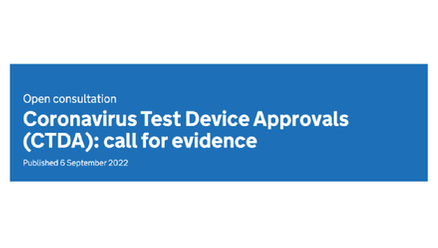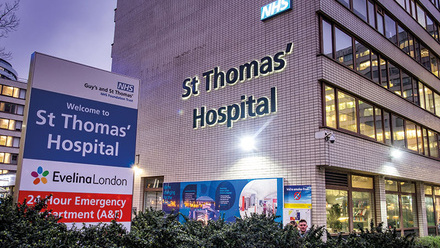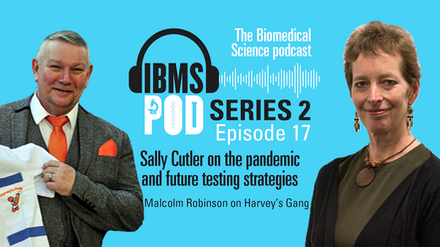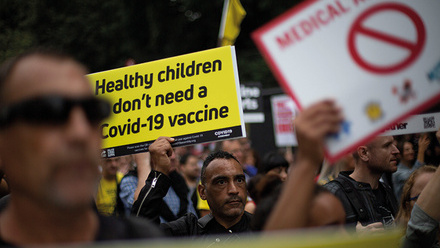High quality staff deliver high quality services
Current COVID-19 testing landscape
The national response to the COVID-19 pandemic has required an unprecedented increase in the UK’s capacity to provide timely and accurate PCR and serology testing for the SARS-CoV-2 virus. The UK government has aimed to control the virus by increasing testing numbers and by implementing the test, track and trace programme. The IBMS supports this strategy and is proud of the achievements that the biomedical science profession has delivered in such a short timeframe.
However, the pace of upscaling testing capacity across the healthcare sector must not lead to a reduction in the quality of the diagnostic testing process. Before we set up more mass testing centres, we must work together to assure the quality of testing and the competence of staff and make sure that current and any future centres will be more closely integrated with National Health Service (NHS) systems.
Established diagnostic testing facilities (i.e. pathology laboratories in the NHS and private healthcare sector) have typically evolved their processes over a number of years and have some of the highest quality testing programmes in the world. This has been achieved through the implementation of robust quality management systems that are proven to provide high quality and safe services through medical laboratory accreditation (e.g. to ISO15189:2012 standards).
As the next phase of increasing testing capacity is undertaken, it is essential that the provision of a high quality and safe testing service is at the centre of the national testing strategy. We should not sacrifice quality for quantity.
Quality matters
It is well known in laboratory medicine that the one thing worse than no result is the wrong result. The IBMS has published guidance on the role of the Quality Manager in Clinical Laboratories that outlines the minimum expectations of the quality management system in relation to the Quality Manager and their role. Of particular note are the recommendations for quality governance and clinical governance. To ensure the process is undertaken to a suitably high standard the IBMS recommends that “the quality manager is a biomedical scientist and holds a recognised quality management qualification such as the Institute’s Certificate of Expert Practice in Quality Management, in addition to a Masters level qualification such as an MSc or the Institute’s Higher Specialist Diploma in either a scientific specialism or in Leadership and Management”.
The IBMS expects that all testing facilities performing COVID-19 PCR and serology testing seek appropriate medical laboratory accreditation as soon as possible. There are now a number of laboratories that have achieved ISO15189 accreditation for their COVID-19 testing processes, and the number pending an assessment to grant this is increasing. Laboratories that have medical laboratory accreditation are kite marked as providers of a high quality and safe service, often for very similar tests to the COVID-19 assays. Prior accreditation provides reassurance that there is minimal risk of poor quality practice while a laboratory awaits accreditation for new tests.
The Pathology Quality Assurance Review, chaired by Dr Ian Barnes (January 2014) stated that “accreditation is widely used, including by the Care Quality Commission (CQC), as a marker for quality of pathology services and there is an expectation in the system that laboratories should achieve this independent seal of approval”. The Royal College of Pathologists (the RCPath) also endorsed this position in ‘COVID-19 testing: a national strategy’ (June 2020) by stating, ‘Testing standards must be upheld. Testing will be carried out in many settings, but must be carried out as part of a quality assured system, meeting accredited standards in regulated or approved settings. Accredited standards will apply to both laboratory and point-of-care testing.’
The IBMS supports these views and recommends that all laboratories achieve accreditation as a mark of quality and assurance for patients.
High quality staff deliver high quality services
Statutory regulation
Due to the complexity of the testing being undertaken to detect the SARS-CoV-2 virus there is a need for a highly skilled and regulated professional workforce. For those providing a service for the NHS the Health and Care Professions Council (HCPC) is the regulatory body responsible for setting and maintaining standards of professional training, performance and conduct of the healthcare professionals that it regulates, including those practicing under the protected title of ‘biomedical scientist’.
HCPC registration has been mandatory for a wide number of professions within healthcare for many years. The intention of registration is to:
- Protect the public
- Demonstrate skills and knowledge
- Ensure service users are clear on the scope of practice registrants have and behaviors that should be expected
- Provide a requirement for Continual Professional Development (CPD)
- Maintain public confidence in the respective profession
The IBMS expects that any workforce undertaking diagnostic testing for COVID-19 should meet the same minimum requirements as any other medical laboratory workforce that is involved in diagnostic testing.
This view was echoed by the RCPath in ‘COVID-19 testing: a national strategy’, when it emphasised the importance of the right test, at the right time and ‘carried out by skilled, trained laboratory professionals to recognised and accredited quality and service standards’.
The Pathology Quality Assurance Review (January 2014) also commented on the requirement for those commissioning pathology testing services to “recognise the need for competent and appropriately trained staff in quality management systems, and adopt meaningful indicators of quality assurance competence into locally agreed contracts”.
Non-registered staff
Non-registered staff contribute to the overall sample journey with a variety of roles. Data Entry and communications are performed by non-registered staff following standard operating procedures (SOPs). The level of technical roles non-registered staff perform varies with the level of automation in a laboratory’s process. A significant level of bench work can be performed by trained non-registered staff and that is common in NHS and independent sector environments alike. However, HCPC registered scientists must be available to provide ongoing indirect supervision, and troubleshooting in this work flow model.
The ratio of Registered Scientists and non-registered support should be assessed in each individual situation; it will vary with the level of automation available and the stability of the assay and workflow, but should provide sufficient numbers of Registered Scientists that any supervision is real and not "nominal”.
The IBMS supports the development of non-HCPC registered scientists and support staff. Indirect supervision is a process that works well in medical laboratories and allows for an appropriate skill mix in the workplace. It has been widely accredited and meets ISO15189:2012 requirements if undertaken correctly. However, the IBMS would expect that the supervising HCPC registered scientist is only responsible for a number of unregistered staff that allows them to safely provide adequate supervision.
Scientific staff
The IBMS expects that all scientific staff supervising a laboratory section and/or group of non-registered staff working in the laboratory are HCPC registered as a biomedical scientist or clinical scientist with the appropriate experience and grade commensurate of the role in question.
The IBMS also strongly recommends that HCPC registered scientific staff should be the only staff group to undertake the following roles in the laboratory:
- Review and interpretation of anomalous test results
- Approval and subsequent technical authorisation of test results
- Provide clinical authorisation and interpretation of test results*
- Provide sign off for the validation or verification of new technologies, assays or equipment before being brought in to routine use
*also to be provided by the General Medical Council (GMC) registered medical colleagues
In support of this recommendation, the IBMS offers a number of routes to HCPC registration as a biomedical scientist from direct enrollment through an approved training programme (Certificate of Competence) to experiential and equivalence routes. There is also an equivalence route available for certain clinical scientist disciplines. Further information on these registration routes can be found on the IBMS website (www.ibms.org).
Laboratory director
The IBMS recommends that the laboratory director, or equivalent, are suitably qualified and experienced to undertake such a role. The RCPath advises that a head of department should be a “medically qualified consultant or equivalent consultant clinical scientist who have worked in the service for at least five years. They should possess the FRCPath or and equivalent qualification”. The same criterion should also be applied to those having delegated responsibility for roles that fall within the remit of a laboratory director (as per sub clause 4.1.1.4 of ISO15189:2012).
The role must also encompass the clear responsibility for “laboratory service performance against EQA schemes for all analytes and tests in the laboratory repertoire” as recommended in the RCPath King’s Mill Report (Feb 2013) as a result of the issues found in result reporting in 2011.
Supporting the expertise of our members
The IBMS is proud of the expertise of our members who work at the heart of healthcare in laboratory medicine 24 hours a day, 365 days a year, contributing to over 70% of diagnoses in the NHS processing over a billion samples every year. The biomedical science workforce have continued to go above and beyond to get the UK into a position to deal with this pandemic and are working tirelessly to help get patients and their medical teams the results that they need.
The IBMS and our members want to ensure that all laboratory and rapid testing for COVID-19 is preformed to the highest quality and in the safest manner possible. We would welcome working with any institutions, government bodies or testing organisations to help support these objectives.





